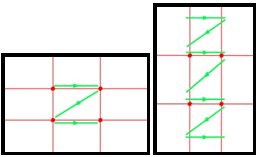Making sentences negative in French is a bit different than in English, due to the two-part negative adverb and the sometimes difficult placement. Normally, ne...pas is the first negative adverb that we learn. But there are actually many negative adverbs constructed just like it, so once you understand ne... pas, you can make just about any sentence negative.
USING 'NE'...'PAS'
To make a sentence or question negative, place ne in front of the conjugated verb and pas (or one of the other negative adverbs) after it.
Ne...pas translates roughly as "not."
Je suis riche > Je ne suis pas riche.
I'm rich > I'm not rich.
Êtes-vous fatigué ? > N'êtes-vous pas fatigué ?
Are you tired? > Aren't you tired?
Making sentences negative in French is a bit more complicated than in English. This summary of the different kinds of negation and negation-related grammatical structures should help clear up some of the confusion. The title of each negation category links to a detailed lesson with examples of usage and a quiz.
(Don't) just say non
No, not a chance, I don't think so, and more.
| non
pas question ! |
Negative adverbs
Negate or restrict the action of the verb they modify.
| ne... pas
ne... jamais |
Negative adjectives
Negate or cast doubt on a quality of the noun they modify.
| ne... nul
ne... aucun |
Negative pronouns
Negate or cast doubt on the existence of the noun they replace.
| ne... rien
ne... personne |
Negative conjunction
There's only one:
| ne... ni... ni...
|
Negative questions
There's a special French word to respond yes when someone else says no. | - Non.
- Si ! |
Negating infinitives
2-part negative structures stay together in front of infinitives.
| Ne pas toucher.
Ne jamais fermer. |
N'importe... expressions
Designate an unspecified person, thing, or characteristic.
| n'importe qui
n'importe quel... |
Pas
Negate a non-verbal structure.
| pas beaucoup
pas souvent |
Double negatives
Two negatives don't make a positive in French.
| Ce n'est pas rien.
Je n'ai jamais vu personne. |
Formal negation
There are three negative structures particular to formal French.
| ne... point
avant qu'il ne... |
Informal negation
Ne is often dropped in spoken French.
| Je sais pas.
Bouge pas ! |
In compound verbs and dual-verb constructions, the negative adverbs surround the conjugated verb (except for nulle part, which follows the main verb).
Je n'ai pas étudié.
I didn't study.
Nous n'aurions pas su.
We wouldn't have known.
Il ne sera pas arrivé.
He won't have arrived.
Tu n'avais pas parlé ?
You hadn't spoken?
Il ne veut pas skier.
He doesn't want to ski.
Je ne peux pas y aller.
I can't go there.
When there is an indefinite article or partitive article in a negative construction, the article changes to de, meaning "(not) any":
J'ai une pomme > Je n'ai pas de pomme.
I have an apple > I don't have any apples.
USING 'NE' AND AN ALTERNATIVE TO 'PAS'
Ne...pas is the most common French negative adverb, but there are a number of others that follow the same rules of grammar.
ne...pas encore not yet
Il n'est pas encore arrivé. He has not arrived yet.
ne...pas toujours not always
Je ne mange pas toujours ici. I don't always eat here.
ne...pas du tout not at all
Je n'aime pas du tout les épinards. I don't like spinach at all.
ne...pas non plus neither, not either
Je n'aime pas non plus les oignons. I don't like onions either.
ne...aucunement not at all, in no way
Il n'est aucunement à blâmer. He is in no way to blame.
ne...guère hardly, barely, scarcely
Il n'y a guère de monde. There's hardly anyone there.
ne...jamais never
Nous ne voyageons jamais. We never travel.
ne...nullement not at all
Il ne veut nullement venir. He doesn't want to come at all.
ne...nulle part nowhere
Je ne l'ai trouvé nulle part. I couldn't find it anywhere.
ne...point not (formal/literary equivalent of ne...pas)
Je ne te hais point. I don't hate you.
ne...plus no more, not anymore
Vous n'y travaillez plus. You don't work there anymore.
ne...que only
Il n'y a que deux chiens. There are only two dogs.
USING 'PAS' WITHOUT 'NE'
The French negative adverb pas is often used together with ne, but pas can also be used all by itself for various reasons.
Pas can be used without ne to negate an adjective, adverb, noun, or pronoun. But it can also be used to negate a verb, and this is explained in the lesson on informal negation. Note that this use of pas alone is somewhat informal. In most cases, you should be able to construct a sentence using ne...pas that means the same thing.
Pas + Adjective
Il doit être ravi ! Pas ravi, mais content, oui.
He must be delighted! Not delighted, but (yes, he is) happy.
C'est un homme pas sympathique.
He's not a nice man.
Pas gentil, ça.
That's not nice.
Pas possible !
That's not possible!
Pas + Adverb
Tu en veux ? Oui, mais pas beaucoup.
Do you want some? Yes, but not a lot.
Ça va ? Pas mal.
How are you? Not bad.
Pourquoi pas ?
Why not?
Pas comme ça !
Not like that!
Pas si vite !
Not so fast!
Pas souvent, pas encore, pas trop
Not often; not yet; not too much
Pas + Noun
Elle vient mercredi ? Non, pas mercredi. Jeudi.
Is she coming on Wednesday? No, not Wednesday. Thursday.
Je veux deux bananes. Pas de bananes aujourd'hui.
I want two bananas. No bananas today.
Pas de problème !
No problem!
Pas + Pronoun
Qui veut nous aider ? Pas moi !
Who wants to help us? Not me!
Tu as faim ? Pas du tout !
Are you hungry?Not at all!
Ah non, pas ça !
Oh no, not that!
Pas + Verb
Je ne sais pas. > Je sais pas. Or contractions that are even more colloquial such as:
J'sais pas, Sais pas, and even Chais pas.
I don't know.
Pas can also be used to ask for confirmation:
Tu viens, ou pas ?
Are you coming or not?
Je l'aime bien, pas toi ?
I really like it, don't you?
Pas vrai ?
Right? or Isn't that true?
Note: Pas can also be a noun meaning "step," which is found in many French expressions.
source
https://www.thoughtco.com/french-negative-adverbs-1368801











































